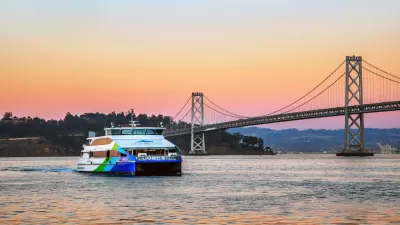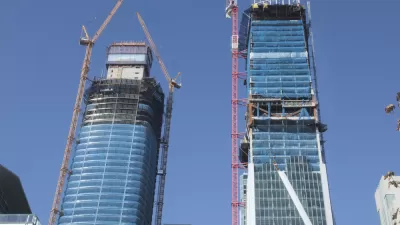In this pair of 'cause and effect' articles, USA Today reporters describe the many companies seeking new office and R&D sites in San Francisco, whether relocating from expensive downtown Palo Alto, the South or East Bay, or outside the state or U.S.
Jon Swartz and Scott Martin report from San Francisco, the new "Silicon Gate" as the print article was titled.
"San Francisco boasts the highest tech-jobs growth rate in the nation, according to real estate services firm CBRE. Current growth is about double the rate of the next two fastest-growing markets of New York City and Silicon Valley.
Its growing appeal as tech's nexus is powered by affordable office leases relative to the old Valley, favorable business taxes, and the allure of a major city."
For example, "San Francisco has vacancy rates of 9% to 10% for premium spaces that run about $50 per square foot, compared with 4.4% vacancy and $73 per square foot in Palo Alto."
"Young designers and software engineers also prefer the urban landscape, so companies are flocking to San Francisco to recruit top talent. Big and small tech companies are setting up headquarters here - Twitter, Zynga, Pinterest and Pulse, among them.
Companies are moving to San Francisco from the Valley because (their employees) don't want to be riding a Wi-Fi bus. They want to ride a bike to work," says Caroline Green, Northern California director of research for real estate firm Cushman & Wakefield. Companies "are trying to get any advantage they can - and location is a key advantage."
But what's been good for companies seeking new homes or offices has not been good for their employees, reports Martin in in the accompanying article, "San Francisco apartment rents soar as tech companies grow"
"In the past three months, average asking rents are up 12.9% from a year ago, according to market data by RealFacts. Studios now fetch over $2,100 a month here."
"San Francisco is the nation's unusually hot spot because of the tech boom, says Nick Grotjahn, spokesman for RealFacts. 'The incomes and salaries these people are making are far greater than the rest of the United States.'"
FULL STORY: San Francisco is fast becoming a technology hub

Maui's Vacation Rental Debate Turns Ugly
Verbal attacks, misinformation campaigns and fistfights plague a high-stakes debate to convert thousands of vacation rentals into long-term housing.

Planetizen Federal Action Tracker
A weekly monitor of how Trump’s orders and actions are impacting planners and planning in America.

San Francisco Suspends Traffic Calming Amidst Record Deaths
Citing “a challenging fiscal landscape,” the city will cease the program on the heels of 42 traffic deaths, including 24 pedestrians.

Defunct Pittsburgh Power Plant to Become Residential Tower
A decommissioned steam heat plant will be redeveloped into almost 100 affordable housing units.

Trump Prompts Restructuring of Transportation Research Board in “Unprecedented Overreach”
The TRB has eliminated more than half of its committees including those focused on climate, equity, and cities.

Amtrak Rolls Out New Orleans to Alabama “Mardi Gras” Train
The new service will operate morning and evening departures between Mobile and New Orleans.
Urban Design for Planners 1: Software Tools
This six-course series explores essential urban design concepts using open source software and equips planners with the tools they need to participate fully in the urban design process.
Planning for Universal Design
Learn the tools for implementing Universal Design in planning regulations.
Heyer Gruel & Associates PA
JM Goldson LLC
Custer County Colorado
City of Camden Redevelopment Agency
City of Astoria
Transportation Research & Education Center (TREC) at Portland State University
Jefferson Parish Government
Camden Redevelopment Agency
City of Claremont





























